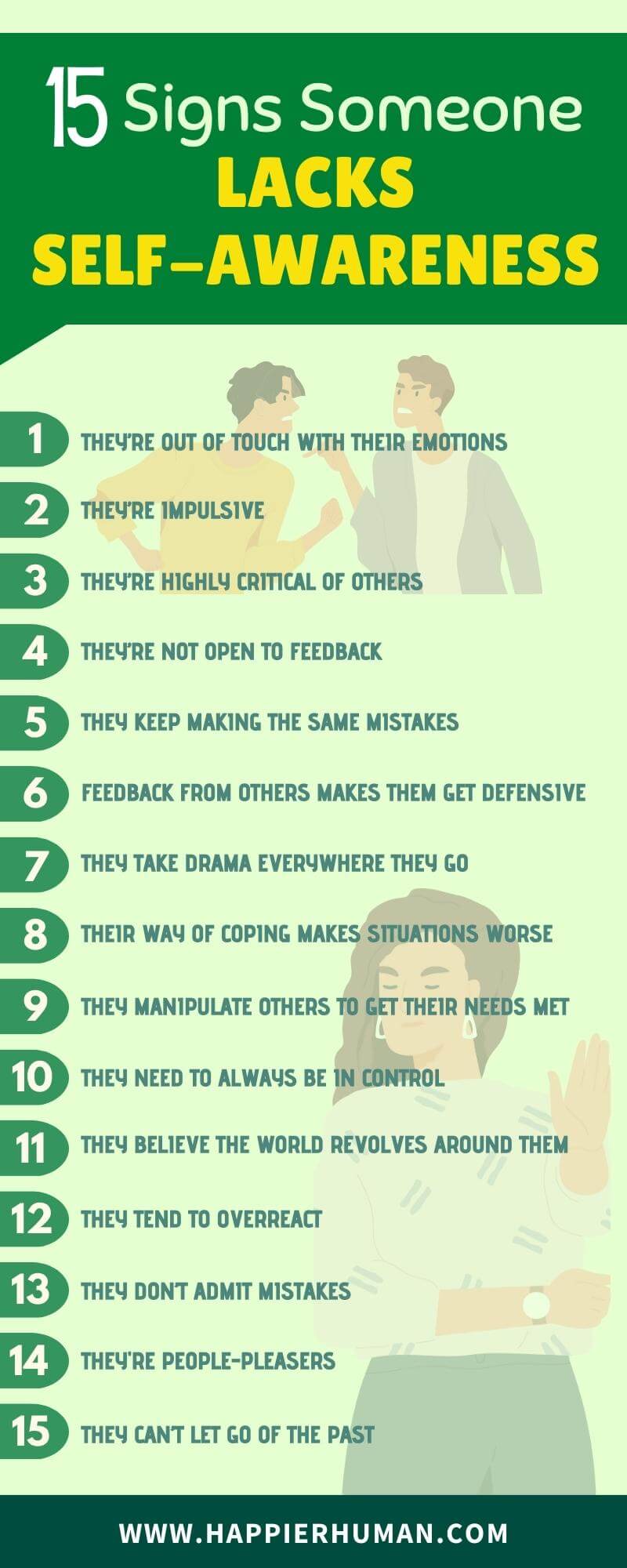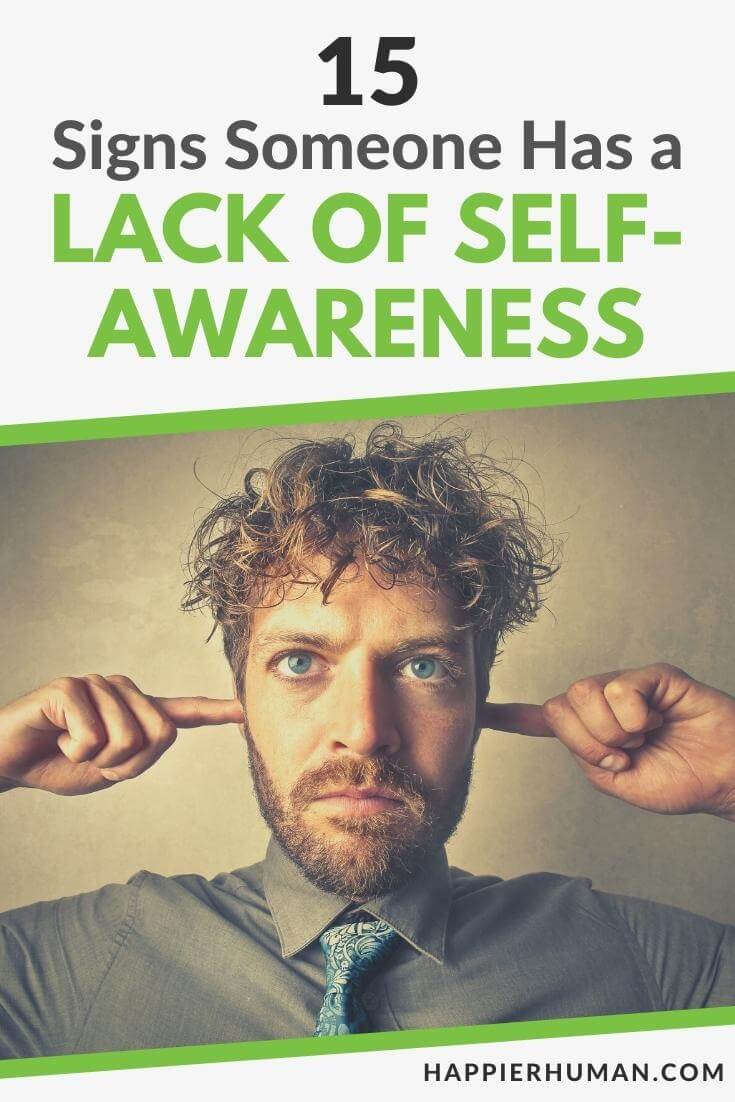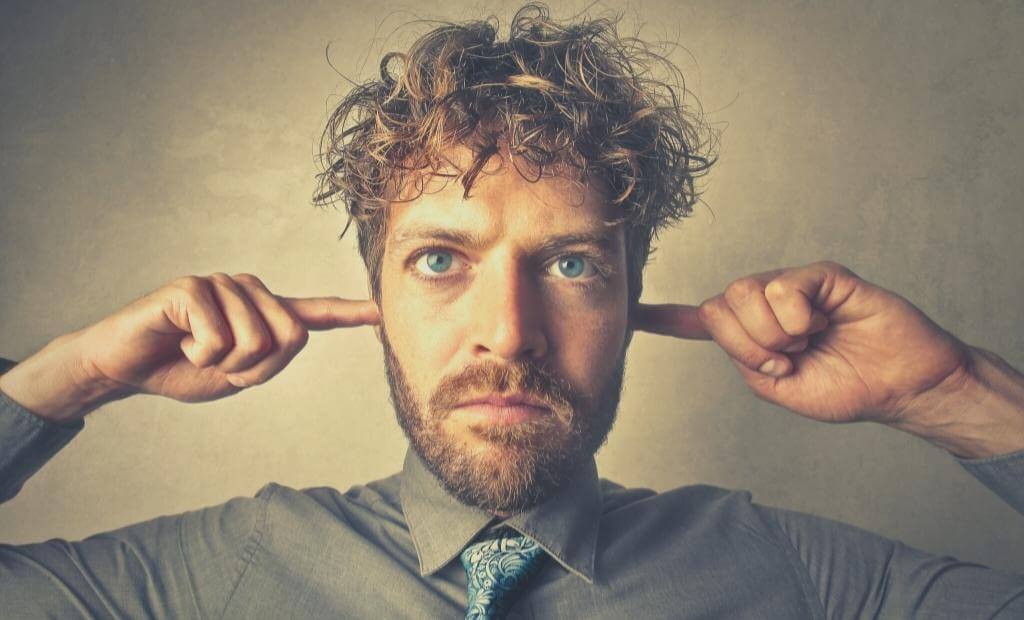A lack of self-awareness is understood as one of the reasons why many people fail to experience greater success. It isn’t surprising. You simply can’t walk into a store and buy self-awareness. Actually, you first have to be aware of self-awareness and then learn how to increase this human ability.
Good for you if you’re already living consciously aware of yourself and your environment as I am (or so I think). Even though many people believe they’re self-aware, only 10%—15% actually are, explained Harvard Business Review. Some even grossly overestimate self-awareness levels, according to an article by NBC News.
Living in conscious awareness allows us to be more in tune with who we are and how our thoughts and behavior shape our life experiences.
If, however, you think you or someone you care about is lacking in the self-consciousness department, then stick around for 15 telltale signs. Of course, I’ll set the stage by explaining more about self-awareness, why it’s important, and ways to tap into that ability.
What Is Self-Awareness?
From a psychological standpoint, self-awareness is the ability to reflect on who you are in terms of your personality traits, passions, and thinking and behavior patterns. It’s also an aspect of emotional intelligence.
Awareness of self also occurs on a spectrum from low to high. Some people are more self-aware than others because they’re born with that ability or work on building it through techniques such as mindfulness.
Internal and External Self-Awareness
Internal self-awareness refers to how you see yourself from within. External self-awareness means understanding how others see you. Someone who’s fully aware of themselves knows who they are and what they want to achieve. They ask for feedback and value the opinions of others.
There’s also subjective self-awareness (awareness of your physical self) and objective self-awareness. Objective self-awareness allows you to focus attention on and evaluate your thoughts, behaviors, and feelings. The results are largely guided by your personal standards and expectations.
Focusing attention on your SELF helps you identify and change harmful behaviors to achieve positive outcomes. Moreover, objective self-awareness plays a key role in the development of self-conscious emotions, such as embarrassment, guilt, and shame.
Why Is a Lack of Self Awareness a Problem?
Have you ever dealt with someone who you felt was acting immaturely? You made the conclusion based on the things they said or did. The root problem could be a lack of awareness of self and how one is perceived by others.
Interestingly, a person could be highly intelligent and still not have a strong ability to self-introspect. Regardless of the root cause, low self-consciousness can result in the following problems:
From that, you can see why it’s necessary to live aware. Having a deeper sense of internal self-awareness enables us to look inward (introspect) to understand our behaviors and how they affect others. We can then use that information to make changes to improve our world experiences.
Based on our level of awareness, we may be capable of assessing our emotions and figuring out what triggers certain feelings.
Once you understand that self-awareness is necessary for you to live better, the next quest is learning how to cultivate the skill. Here are some suggestions:
How to Know Someone Lacks Self-Awareness: 15 Obvious Signs
Recognizing the following signs you or someone else ranks low in self-awareness is meant to encourage taking steps towards behavioral changes.
#1. They’re out of touch with their emotions
Fear, anger, sadness, joy, guilt, shame, and embarrassment are among the basic emotions we experience. Surprisingly, many of us have difficulty identifying the source of the emotion and why it gives us the accompanying feelings. Not being attuned to their emotions can cause a person to react inappropriately.

They’re unable to see how the current situation is linked to their actions. The disconnect often prevents them from taking responsibility for their role in conflicts. After flying off the handle with their partner, someone high in self-awareness can introspect by asking themselves, “Why did I behave in that manner?” They’ll use the answer to guide future reactions.
#2. They’re impulsive
Impulsive means acting without thinking about what they’re about to do. Incidentally, impulsivity is also a sign they lack the ability to self-regulate. Not thinking things through bars them from considering the consequences of their actions.
Common impulsive behaviors include aggression, emotional eating, and substance abuse. Another example is reckless behavior, such as drinking and driving and random sex. Those who act without thinking aren’t always sure why they acted a certain way.
#3. They’re highly critical of others
Criticizers tend to have deep insecurities. They usually bad-mouth people to cope with stress or make themselves feel better. It still isn’t fair to be on the receiving end of their attacks. They might find fault in your choice of clothing, food, friend, or partner.
To imply that they are smarter than you, they may say demeaning things like, “You’re so dumb for doing that.” Put-downs give them an ego boost. Were they able to understand how you feel being criticized, they might refrain from the behavior.
#4. They’re not open to feedback
We all make mistakes and can use some guidance in the form of advice and feedback from time to time. Someone with a lack of self-awareness is usually not willing to listen to what others have to say about their behavior at home, at work, or in relationships.
They tend to view feedback as criticism, especially if they are insecure, have low self-esteem, or think they’re beyond reproach. A self-aware person usually understands that a third-party evaluation of them helps reduce conflict, improve behavior, and increase performance levels.
#5. They keep making the same mistakes
This may result from arrogance, meaning they believe they know everything and can do everything right. Another plausible reason is their unwillingness to take advice or accept feedback. They don’t take the lesson learned from their mistakes because they don’t stop to assess why things went wrong.

Learning from their mistakes will allow them to take a different approach to help change the outcome, but they don’t. One of the main reasons is they don’t think they did anything wrong. Therefore, there’s no need to make changes.
#6. Feedback from others makes them get defensive
Not only do they reject feedback, those who are deeply unaware of their SELVES often react defensively. Let’s say it’s your mother, and she’s being controlling. You decide to call out the behavior. She may take it as an attack on her personality.
She’s not likely to acknowledge she overstepped a boundary. What you might notice instead are attempts to justify the behavior. She may claim she was only trying to protect you or steer you in the right direction.
#7. They take drama everywhere they go
Self-aware people don’t tend to attract or get involved in drama, like those struggling with a lack of self-awareness. If you notice someone in your social circle says whatever hurtful things they feel like or aren’t respecting other people’s boundaries, they just might have trouble connecting to other people’s feelings.
For one, this demonstrates a lack of empathy, which is a major part of self-consciousness and emotional maturity. Saying hurting things while disregarding the feelings of others causes rifts. Unaware, they may not understand why people avoid them or pull away.
#8. Their way of coping makes situations worse
Everyone experiences stress, challenges, setbacks, or emotional pain at some point in life. How they cope can make a difference in the outcome. Those who aren’t consciously aware of their choices and the consequences may attempt to escape the discomfort through unhealthy coping mechanisms that don’t solve problems.
Coping skills that may bring about temporary relief but don’t solve the problem include emotional eating, substance abuse, and impulsive shopping. These actions may only cause more problems, i.e., obesity, addiction, or financial losses.
#9. They manipulate others to get their needs met
Manipulation is the art of getting people to think, do, and feel exactly as they want. Why would anyone resort to such tactics, except they aren’t aware that it amounts to emotional abuse? The proper way to get needs met is by expressing them using positive “I” language. For example, “I feel good when you help with the chores.”

Instead, manipulators, such as narcissists and sociopaths, often love bomb, gaslight, threaten, or guilt-trip others into doing things for them.
#10. They need to always be in control
Control freaks need to be in control to maintain the illusion that they’re powerful. They won’t take directions, even if it’s helpful, or keep changing things to suit themselves. In conversations, they try to dominate the subject. In social groups, they try to dominate others.
Usually, they’ve got to win and will seek to get the last say. People may behave in this manner because they don’t trust anyone to get things done the way they will. It makes sense since they tend to lack trust in others and in themselves.
#11. They believe the world revolves around them
The belief tends to show up as self-centeredness, arrogance, self-entitlement, and using others to fulfill personal needs. Incidentally, those traits are also seen in people with narcissistic personality disorder (NPD). According to research, those with NPD overestimate their self-importance and self-worth (air of superiority).
In actuality, narcissism at its core is driven by insecurity and low self-esteem. Narcissist or not, one might see why individuals lacking awareness of their behavioral patterns might put their needs first while dismissing the needs of others.
#12. They tend to overreact
A tendency to overreact may stem from being impulsive and out of touch with their emotions. Someone who is sensitive to criticism may also easily feel slighted and respond disproportionately.
If they stop to process the situation at hand, they’re likely to remain calm and try to see the other person’s point of view.
In other cases, their feelings might not match the situation because they didn’t pause to check in with their emotions. That can help them understand emotional triggers and how to manage their reactions whether it’s anger, fear, or shame.
#13. They don’t admit mistakes
Are you dealing with someone who refuses to say, “I’m sorry?” Perhaps the reluctance is rooted in an inability to empathize. It’s human to err, but they’re somehow unable to make that connection with themselves. Saying sorry means owning up to mistakes. For those who aren’t that in tune with their inner selves, admissions make them feel flawed or inferior.
They might instead resort to lying, denying, or shifting blame to avoid taking responsibility. Individuals with a higher degree of awareness are quick to apologize. They know how they would feel if the shoe was on the other foot.
#14. They're people-pleasers
Someone who has a healthy concept of self doesn’t usually get their sense of self-worth from pleasing others. They see individuals as capable of self-reliance and independence as they are.
Although willing to help, they won’t bend over backward to make others happy like those on the lower side of self-awareness.

People-pleasers have a really difficult time saying, “No.” They’ll keep sacrificing their own needs to help others. The tendency is linked to low self-esteem. Being told they’re a good person for helping provides validation and makes them feel worthy.
#15. They can’t let go of the past
Highly self-aware folks are able to reflect on past experiences and mistakes and accept them for what they are. They avoid rumination and beating themselves up for the things they had no control over.
Those low in awareness and emotional maturity dwell on the past to gain a sense of control over events. What that does is create an illusion of control. We cannot control the past. If anything, rumination only brings unnecessary emotional suffering, such as regret, shame, guilt, and anxiety.
Final Thoughts on a Lack of Self Awareness
Self-awareness is crucial as it provides a way for us to judge the rightness of our thoughts and actions. Fortunately, we can take steps to increase awareness through daily reflection and introspection. It seems that the higher the level of our self-consciousness, the better we become at self-regulation.
We’re able to communicate more effectively and make better decisions. This paves the way for self-growth, increased self-confidence, better relationships, and more success in other areas of life. For more on this topic, check out 57 Self-Awareness Quotes to Know Yourself Better. Feel free to share it to help someone on their self-discovery journey.


